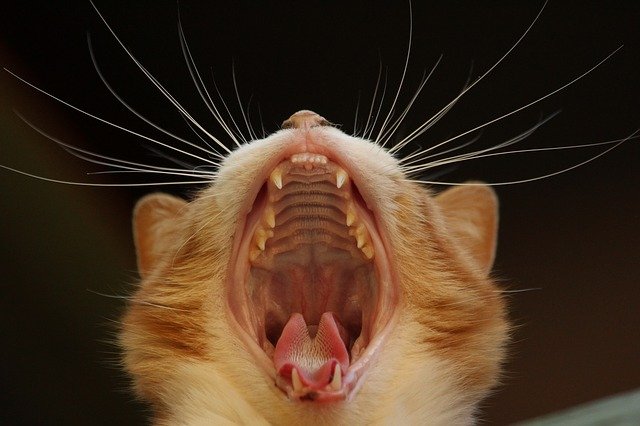
Your Cat’s Bad Breath Might Mean it Has Dangerous Dental Problems
Dental disease is the most common health condition veterinarians see. Over half of all cats over the age of three have some form of dental disease.
More than Bad Breath
When we talk about dental disease, most think of unsightly tartar on the teeth, or bad breath. While this is true, our biggest concern is what you can’t see. As dental disease progresses, it leads to more significant consequences below the gum line. This includes bone loss around the tooth or jaw, infection, pain, fistulas, or the loss of the tooth altogether. While there is a lot of overlap between cats and dogs, cats develop oral conditions that are a little more unique to their species. These conditions are resorptive lesions and stomatitis.
Lesions in the Mouth
Resorptive lesions occur when a portion of the tooth develops erosion and loss of the normal tooth structure, somewhat similar to a cavity. This process can occur above the gum line (“crown” of the tooth), or below the gum line (root). This leads to chronic pain in the mouth and can affect appetite. The only treatment for this condition is extraction of the affected teeth. While we can sometimes identify these during a routine exam, in many cases it is not until full mouth x-rays are taken during the dental procedure that these are identified.
Inflammation
Stomatitis is a severe and painful inflammatory condition of the gingiva and mucosa of the mouth. It occurs due to an abnormal immune response to plaque/tartar on the surface of the teeth. Treatment either consists of medical management with immune suppressing drugs, or extraction of most, if not all teeth.
How to Detect Dental Danger
Signs to look for that indicate dental disease in your cat include discolored teeth, bad breath, red or bleeding gums, decreased appetite, weight loss, drooling, and tilting the head or chewing from one side while eating.
As a veterinarian in practice, I have seen first hand the benefits to my patients when their dental disease is properly treated. Owners have described positive changes, where their previously withdrawn cat has become playful, affectionate and full of life. Much like a toothache can become a significant detriment to our own lives, so can a painful tooth have those effects on a cat. If you are concerned that your cat may have dental disease, the first step is scheduling an exam. From there, we can discuss options for oral care at home, or discussing scheduling your cat for a dental procedure at our hospital.
EMRVC can’t wait to take care of your pet. Contact us today to set up an appointment!
Essex Middle River Veterinary Center provides medical and surgical care for cats and dogs at our animal hospital and veterinary clinic in Essex, Maryland, just outside of Baltimore. Our services include preventive wellness care exams, vaccines, spays/neuters, and a variety of specialized care. Our state-of-the-art veterinary offices are conveniently located near I-695 where we see pets from Towson, Honeygo, White Marsh, and other neighboring Baltimore areas.
